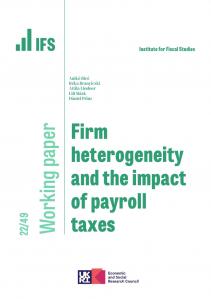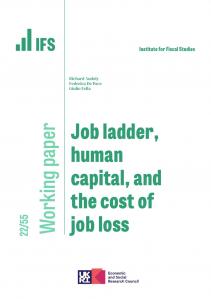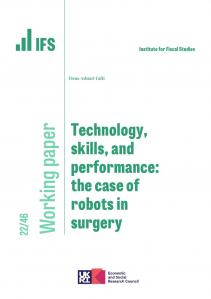China has experienced unprecedented investment in skills and science, which has resulted in rapid growth in innovative outputs. New evidence suggests that Chinese inventors have the capacity to engage in research at the technology frontier. Such trends have fuelled widespread concerns over Western economies' ability to maintain their dominance in knowledge creation and high skill employment. However, innovation is not a zero-sum game; the success of China need not be at the expense of the West. The key challenge for the UK and other knowledge economies is to invest now in order to foster a highly skilled workforce that is able to both compete for and engage collaboratively in tomorrow's breakthroughs and that is flexible enough to adjust to changing conditions.
Recent years have seen increasing attention on China's technological performance, which is unsurprising given the barrage of statistics showing that innovative activities in China are growing at an astounding rate. Over the last decade, there has been rapid growth in investment in Research and Development (R&D) such that the proportion of Chinese national income invested in R&D (1.1%) is now comparable to that in the UK (1.15%). At the same time, large investments in education have produced a proliferation of Chinese graduates, almost half of which study for science and engineering degrees.
This investment in research capacity has been translated into equally impressive growth in innovative outputs. For example, in 2010 China was the fourth largest filer of patent applications to the World Intellectual Property Organization. Under a simple extrapolation of current trends, China could overtake the US to be the world's largest filer of patent applications by 2015. Contrary to much of the academic literature to date but in line with public perception, the proportion of Chinese innovation that stems from fundamental research is at least as high as in the West. That is, Chinese inventors display the capacity to innovate alongside US and European inventors at the technology frontier. An important part of these trends have been driven by the investment of Western multinationals who account for 25-30% of the R&D investment in China and who increasingly create new technologies using Chinese inventors.
Given these trends, concerns over Western economies' ability to maintain their dominance in knowledge creation and high skill employment are not surprising - innovation has been the engine of economic growth and lies at the heart of increased living standards. Nor are they wholly unfounded. Recent work prepared for the European Commission concluded that if the recent trends in R&D continue then "in 2025, the United States and Europe will have lost their scientific and technological supremacy for the benefit of Asia". Others have articulated the potential for shifts in the global job market for science and engineering workers towards China to erode US dominance by diminishing the current comparative advantage in high tech production. However, there are many reasons why these trends are not necessarily bad news for the West. Firms locating activity in China, whether to adapt products to local markets or gain access to specific skilled workers at a lower cost, can lead to standard gains from trade - firms experience improved performance and may transmit knowledge back to the home country. There is evidence that knowledge flows across national borders and is less restricted by distance than was the case 20 years ago. Importantly, innovation is not zero sum game - that more research is being carried out in China does not necessarily imply that less will be undertaken in the West. Indeed, it might be expected that there are more synergies in the creation of new technologies than new goods or services such that an increase in knowledge output in China compliments, rather than substitutes for, knowledge created in the West. In addition, China represents a new market for technologies developed in the West.
The Policy challenge
The challenges for Western governments relate not to devising policies to deter investment in China or other emerging economies, but to ensuring that they make sufficient investments in their own economies such that they remain leaders in innovation. In large part this means ensuring that we have a high skilled workforce - that can engage, both competitively and collaboratively, in creating new knowledge and that is flexible enough to adjust to changing economic conditions - and that we invest sufficiently in science and research.
In a 2006 speech, China's President, Hu Jintao, launched a plan to make China an innovation-oriented economy and leading science and technology power, proclaiming that "by the end of 2020... China will achieve more science and technological breakthroughs of great world influence, qualifying it to join the ranks of the world's most innovative countries". In support of this ambition, the Chinese government has made unprecedented investments in research capacity and increased incentives for firms to invest in innovation. Juxtapose this with recent policy moves in the UK, and in the West more generally, where austerity packages to reduce borrowing have commonly involved real cuts to the budgets for science, direct research funding and higher education. Even where science budgets have been relatively protected from spending cuts, as in the UK, investment as a proportion of national income is due to fall in coming years. Failing to invest sufficiently in science and skills can be short sighted. The impact of such spending occurs in the long run, in the form of higher productivity and economic growth. Being able to compete with China in 10 years time requires investment in skills and research today. This was recognised in 2009 by US President Obama's American Recovery and Reinvestment Act that increased in spending on science, stating, "We'll provide new technology and new training for teachers so that students in Chicago and Boston can compete with kids in Beijing for the high-tech, high-wage jobs of the future."
The current economic climate should not prevent investment in our capacity for economic growth in the future. The impact of China's rise will depend largely on whether we are with them at the technology frontier or onlookers from the sidelines. We should choose the former.










